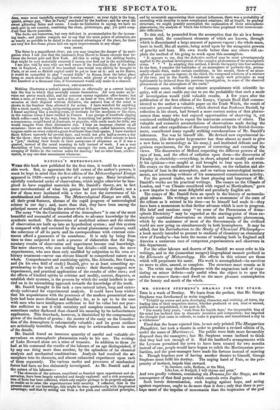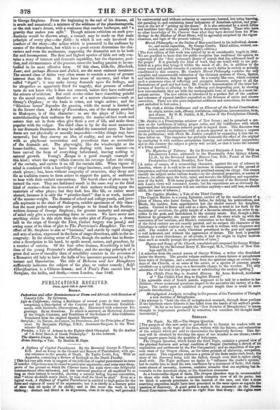MR. GEORGE STEPHENS'S DRAMAS FOR THE STAGE. THIS is a
work of Destiny. We learn from the preface, that Mr. George Stephens was foredoomed to write tragedies. " To build up scenes and acts, developing character, and evolving, ab infra, the leading idea of their respective stories, whether produced or not, read or unread, published or unpublished, is his part in life. " For nearly forty years, even from his boyish days,' the irrepressible bias of his mind has inclined him to dramatic invention and composition; has impelled the thought that came in solitude, to make it populous, and transformed a city to a wilderness."
Fired that the house rejected him, he not only printed The Hungarian Daughter, but took a theatre in order to produce a revised edition of it, under the name of Martinuzzi. The public were little more favourably disposed than the managers; but Mr. Stephens seems inclined to think that they had not enough of it. Had the landlord's arrangements with the Lyceum permitted the town to have been treated for two months instead of one, people would have begun to relish the Martinuzzian pecu- liarities, and the poet-manager have made his fortune instead of marring it. Though hopeless now of having another theatre to himself, George Stephens must fulfil his destiny. The urging hand of Fate, or the pro- pensity of instinct, impels him onward. " In durance, exile, Bedlam, or the Mint,
Like Lee, or Budgell, I will rhyme and print."
And two goodly volumes, containing six Dramas for the Stage, are the consequence of that fatal power which controls even Jupiter.
Such heroic determination, such hoping against hope, and acting against experience, ought to do more than it does ; only that there is per- haps more of the impulse of monomania than the inspiration of the god
in George Stephens. From the beginning to the end of his dramas, all is crude and unnatural; a mixture of the wildness of the phantasmagoria, or the sick man's dream, with a weakness that reaches burlesque, and "a gravity that makes you split." Though minute criticism on such pro- ductions would be thrown away, a remark may be made on that main principle of every play—the fable: in which is not only involved the conduct of the story—the action which is presented to the audience by means of the characters, but which to a great extent determines the cha- racters and even the sentiments, supposing the dramatist not to be both fiat and incompetent. The first and highest species of fable not only con- tains a story of interest and dramatic capability, but the character, posi- tion, and circumstances of the persons, cause the leading passion to be em- bodied in its most effective form. Of this class, Othello, Macbeth, Lear, and perhaps Romeo and Juliet, are the most eminent instances. The second class of fables very often seems to contain a story of greater interest than the first. It may have more of mystery, and what is called " depth" ; it may make strong demands upon the feelings, and be altogether so apparently fitted for tragedy, that persons of refined taste do not know why it does not succeed, unless they have cultivated the science of criticism. But such stories either have something painful to the moral sense, and therefore are of a narrow character—such as Otway's Orphan; or the basis is crime, not tragic action; • and the "felonious intent" degrades the passion, while the moral is limited as in the former class. Arden of Faversham,, one of the dramas ascribed to Shakspere, is of this character : so are the plays of Lillo ; but notwithstanding their unfitness for poetry, the matter-of-fact truth and nature that are in them often give them a sort of life, and make them popular with the vulgar. The third class is by far the most numerous in our dramatic literature. It may be called the concodted story. The inci- dents are not physically or morally impossible—wilder things may have occurred; but they convey no idea of reality, and are rather borne with as playhouse convention and precedents than as necessities of the dramatic art. The playwright, like the wheelwright or the house-builder, seems to have been dealing with inert matter—to have carved the form of everything beforehand, leaving nothing to natural growth. Young's Zanga is a good enough example of this kind ; where the stage villain concocts his revenge before the rising of the curtain, and carries it on till the curtain falls. When vigour of mind is combined with a knowledge of stage business, such plays become stock pieces ; but, born without congruity of structure, they decay and die as tradition ceases to form actors to support the parts, or audiences to bear with their extinct conventions. The fourth class of plots may be termed the ram. They are fashioned much in the same way as the third kind of stories—from the invention of their authors working upon the materials of other plays ; but they look less like life, or rather more absurd, because it is only the " prentice-hand" that is at work, instead of the master-wright. The dramas of school and college youth, and juve- nile aspirants to the chair of Shakspere, exhibit specimens of this class : but the most perfect examples are perhaps to be found in the Destiny- written dramas of George Stephens; for greater maturity and strength of mind only give a corresponding force to errors. We have never met anything richer in this style than the entire plot of Forgery, a drama laid in the reign of George the First, (before forgery was penal,) and owing some of its ideas of plot to The Patrician's Daughter. The very effort of Mr. Stephens to aim at "business," and startle by rapid changes and arts of action, expressed in the form of stage-direction; adds to the in- congruity. In the closing scene of Nero, though the author has in Sueto- nina a description to his hand, he spoils moral, nature, and grandeur, by a number of entrees. Of the four other dramas, Sensibility is laid in time of the young Pretender's rebellion; and the moving principle of a great deal more of rascality than of sensibility consists in the aversion of a Romanist old lady to have the halls of her ancestors possessed by a Pro- testant and Hanoverian. The title of Rebecca and her Daughters sufficiently indicates the subject of the play, or rather comedy; Self- Glorification is a Chinese drama ; and A Poet's Fate carries him to Newgate, the hulks, and death,—scene London, time 1846.



























 Previous page
Previous page